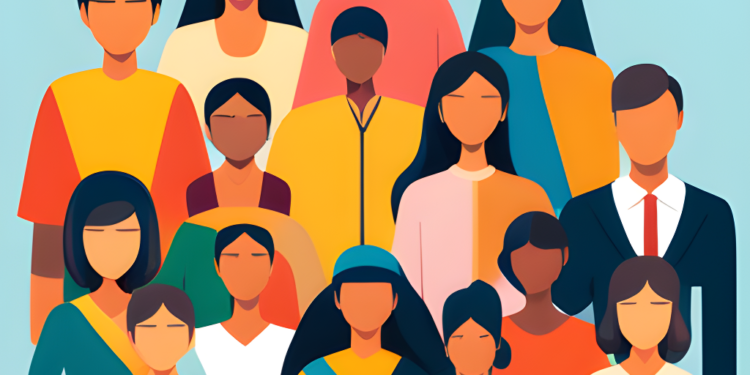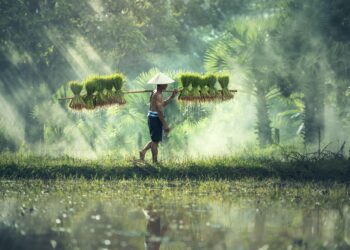In a rapidly developing world, poverty remains a pressing concern for governments across the globe. In India, a developing nation with a vast population, tackling poverty is a complex challenge. However, under the leadership of Prime Minister Narendra Modi, the Indian government has made significant efforts to uplift and empower the downtrodden sections of society.
With the motto of “Sabka Saath, Sabka Vikas” (Collective Efforts, Inclusive Growth), the government has launched numerous initiatives and reforms to ensure that the benefits of progress and development reach all sections of society. This article explores the government’s efforts in serving the poor, honoring the marginalized, and fostering inclusive development in India
Empowering Women, Divyangjans, and Tribal Communities
Recognizing the historical neglect faced by women, divyangjans (differently-abled individuals), and tribal communities, the Indian government has taken decisive steps to empower these marginalized groups. Through a series of targeted measures, the government has demonstrated its commitment to the welfare and upliftment of these sections of society.
The Ministry of Tribal Affairs has witnessed a substantial increase in allocation, underscoring the government’s dedication to tribal welfare. This heightened support has enabled the implementation of impactful initiatives aimed at addressing the unique challenges faced by tribal communities.
Mass awareness camps have been organized in rural areas, specifically targeting women, to foster the formation of Self Help Groups (SHGs). These camps have played a pivotal role in raising awareness about the benefits of collective action and self-empowerment. As a result, there has been a remarkable rise in the number of SHGs, providing women with a platform to support each other, develop entrepreneurial skills, and improve their socio-economic status.
The government’s flagship program, the Pradhan Mantri Awas Yojana (PMAY), has made significant strides in ensuring housing ownership for women. Over 2.23 crore homes have been either jointly or solely owned by women through this initiative. This not only provides women with a sense of security and ownership but also promotes gender equality and empowerment.
Inclusivity and empowerment extend to divyangjans as well. The government has launched targeted initiatives to uplift and empower differently-abled individuals, ensuring they have access to essential resources and opportunities. Awareness camps focusing on assistive aids have been organized, enabling divyangjans to enhance their quality of life and improve their overall well-being. Over 13,528 awareness camps focusing on assistive aids have positively impacted the lives of more than 24.24 lakh Divyangjans.
Educational scholarships have been introduced specifically for differently-abled students, ensuring equal access to education and fostering their academic growth. A total of over Rs 633 crore has been allocated for scholarships, benefitting more than 2 lakh students.Furthermore, skill development programs have been implemented, with the government investing in training approximately 1.3 lakh differently-abled students.
This focus on skill development equips them with the necessary tools to overcome barriers and lead independent and dignified lives. Addtionally, the generation of e-UDID (Unique Disability Identification) cards has reached an impressive count of 73.28 lakh.
Ensuring Health Security for the Poor
Healthcare is an essential component of overall well-being, yet it is often neglected for individuals with low incomes. Recognizing this disparity, the Indian government has taken significant strides in providing social security services to the poor, ensuring access to affordable healthcare and financial protection. These efforts have had a transformative impact on the lives of millions of underprivileged individuals across the country.
At the forefront of the government’s healthcare initiatives is the Pradhan Mantri Jan Arogya Yojana (AB-PMJAY), the world’s largest government-funded health insurance scheme. This ambitious program has successfully reached over 22 crore beneficiaries, providing them with access to quality healthcare services without the burden of exorbitant medical expenses.
Through AB-PMJAY, individuals from economically weaker sections are covered for hospitalization and treatment expenses, enabling them to seek necessary medical care without financial constraints. This scheme has played a pivotal role in reducing the economic burden on vulnerable populations and ensuring their right to healthcare.
In addition to AB-PMJAY, the government has introduced several other schemes aimed at providing financial security and insurance coverage to individuals from underprivileged backgrounds. The Pradhan Mantri Jeevan Jyoti Bima Yojana (PMJJBY) and Pradhan Mantri Suraksha Bima Yojana (PMSBY) are initiatives that offer affordable life and accident insurance, respectively. These schemes provide crucial financial support to individuals and their families in the event of unforeseen circumstances, offering a safety net for those who may not have access to traditional insurance options.
Furthermore, the Atal Pension Yojana (APY) addresses the issue of post-retirement financial security for individuals in the unorganized sector. This scheme provides a pension to individuals in the lower-income bracket, ensuring a dignified and financially stable future for them and their families. By focusing on long-term financial planning and security, APY plays a vital role in reducing the economic vulnerability of marginalized sections of society.
Empathy for Shramjeevis (Workers)
Prime Minister Narendra Modi has consistently demonstrated profound respect and empathy for the working class, with a particular focus on Shramjeevis, or laborers. His gestures, such as washing the feet of sanitary workers during the Kumbh Mela, symbolize his profound acknowledgment of their invaluable contribution to society. These gestures reflect the government’s commitment to improving the lives of laborers and implementing welfare measures to uplift their living standards and enhance social security coverage.
To address the welfare of laborers, the government has introduced various initiatives and programs. One notable program is the Shram Yogi Maan-dhan, a voluntary pension scheme aimed at providing retirement benefits to unorganized workers. This scheme ensures that laborers have a secure and dignified future by enabling them to contribute to a pension fund during their working years. This initiative offers a comprehensive support system that recognizes the significance of laborers’ contributions and provides them with financial security in their later years.
Additionally, the government has implemented the Shramjeevi Superfast Express, a dedicated train service designed to facilitate the mobility of stranded migrant workers. This initiative enables workers to return to their hometowns and families during challenging times or when they face difficulties in their places of work. The provision of this transportation service acknowledges the laborers’ need for mobility and supports their well-being.
Moreover, the government has launched the eShram portal, which serves as a database for unorganized and migrant workers. This portal aims to provide a comprehensive platform for workers to register their information, ensuring better tracking and incorporation into a national database. This initiative facilitates access to social welfare schemes, financial services, and other benefits, thereby enhancing the overall well-being and opportunities available to unorganized workers.
To further strengthen the rights and welfare of laborers, the government has undertaken labor law reforms. These reforms focus on improving job security, minimum wages, and social and health security for workers. By ensuring a more favorable legal framework, the government aims to protect the rights of laborers, enhance their working conditions, and provide them with greater social and economic security.
Reviving Traditional Crafts and Skills
The Indian government recognizes the immense value of traditional craftsmanship and the skills possessed by artisans, who often belong to marginalized sections of society. Understanding the significance of preserving and promoting these crafts, the government has launched initiatives such as the Vishwakarma Kaushal Samman Yojana, which aims to provide institutional support and recognition to skilled craftsmen and artisans.
Through the Vishwakarma Kaushal Samman Yojana, the government focuses on empowering craftsmen from diverse backgrounds, including Dalits, Adivasis, backward communities, and women. The program provides a platform for these artisans to showcase their talents and skills, helping them gain recognition and appreciation for their work. This initiative not only uplifts these marginalized sections but also highlights the rich cultural heritage and craftsmanship of India.
The PM Vishwakarma scheme is a government initiative aimed at providing support to traditional artisans and craftspeople across both rural and urban areas in India. With a substantial financial allocation of Rs. 13,000 crore, the scheme’s initial phase will encompass 18 traditional trades. One of the key components of the program involves granting recognition to artisans and craftspeople through the issuance of a “PM Vishwakarma” certificate and identification cards.
The scheme further offers credit support in two tranches. The first tranche extends credit support of up to Rs. 1 lakh, while the second tranche offers support of up to Rs. 2 lakh, with a notably concessional interest rate of 5%. Beyond financial assistance, the scheme also emphasizes the importance of skill enhancement, providing incentives for skill upgrades and the provision of toolkits. Additionally, the initiative encourages the adoption of digital transactions by offering incentives, and it assists artisans and craftspeople in marketing their products effectively.
To further support artisans, the government has introduced the PM Mudra Yojana, a scheme that offers loans without the requirement of bank guarantees. This financial support enables artisans to access the necessary resources and capital required to enhance their craft, expand their businesses, and improve their livelihoods. By removing the barriers to traditional artisans’ access to loans, the government empowers them to pursue their crafts and contribute to the revival of traditional skills.
In addition to financial assistance, the government recognizes the importance of digital literacy for artisans. Digital literacy campaigns have been initiated to equip artisans with the necessary skills to leverage technology in their craftwork, marketing, and business operations. Technical support is provided to artisans, ensuring they have the knowledge and tools to adapt to changing market trends and employ modern techniques while preserving traditional craftsmanship.
Moreover, the government promotes brand awareness and marketing opportunities for artisans, enabling them to reach a wider customer base. By improving access to marketing platforms and creating avenues for showcasing their products, artisans can gain exposure, secure better market opportunities, and establish sustainable livelihoods. Additionally, efforts are made to ensure improved access to raw materials, as this plays a crucial role in maintaining the quality and authenticity of traditional crafts.
Support for Transgenders and Beggars
The Indian government is resolute in its commitment to addressing the ostracization experienced by specific communities, including transgenders and beggars. Recognizing the unique challenges faced by these marginalized groups, the government has launched the SMILE (Support for Marginalized Individuals for Livelihood and Enterprise) initiative, a comprehensive program aimed at alleviating destitution, beggary, and facilitating the rehabilitation of the transgender population.
The SMILE initiative is designed to provide holistic support to transgender individuals, addressing their multifaceted needs. The government’s focus extends beyond mere welfare provisions, aiming to create an enabling environment that promotes their overall well-being and integration into society. The initiative encompasses various aspects, including rehabilitation, education, welfare, medical facilities, counseling, and skill development.
Under the SMILE initiative, rehabilitation programs are implemented to assist transgender individuals in overcoming the challenges associated with destitution and social marginalization. These programs provide shelter, basic amenities, and support networks, fostering an environment that encourages their reintegration into society. By addressing the root causes of destitution and providing a platform for empowerment, the initiative seeks to break the cycle of poverty and exclusion faced by the transgender community.
Education plays a vital role in empowering marginalized communities, and the SMILE initiative recognizes this importance. Efforts are made to ensure access to quality education for transgender individuals, enabling them to acquire knowledge and skills necessary for personal growth and economic self-sufficiency. By promoting education, the government seeks to equip transgender individuals with the tools they need to lead fulfilling lives and contribute positively to society.
Welfare measures form a crucial part of the SMILE initiative, providing financial support and assistance to transgender individuals. This includes access to healthcare facilities, ensuring their physical and mental well-being. Counseling services are also provided to address the psychological challenges often faced by transgender individuals, supporting their mental health and facilitating a positive transition towards social acceptance.
Under the leadership of Prime Minister Narendra Modi, the Indian government has taken remarkable steps to uplift and empower the poor and marginalized sections of society. Through a range of initiatives, reforms, and welfare programs, the government has focused on inclusive development, ensuring that the benefits of progress reach all sections of society. Over the past decade, the government has supported 25 crore individuals in overcoming multi-dimensional poverty. These endeavors have led to a notable decrease in the poverty rate across India.
The government’s commitment to serving the poor, honoring the marginalized, and fostering an inclusive society is evident in its policies, actions, and the positive impact they have had on the lives of millions of people. With a strong vision and robust policy formulations, India is on the path to becoming a socially inclusive and developed nation, providing equal opportunities and a dignified life for all its citizens.








